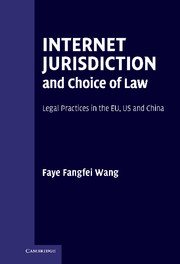Book contents
- Frontmatter
- Contents
- Preface
- List of Abbreviations
- Table of Cases
- PART I Introduction
- PART II Jurisdiction
- PART III Choice of law
- 6 Choice of law in electronic contracting
- 7 EU Internet choice of law regime
- 8 US Internet choice of law rules
- 9 Chinese Internet choice of law approaches
- PART IV Online dispute resolution
- PART V The future
- Appendix 1 Council Regulation (EC) No 44/2001 of 22 December 2000 on jurisdiction and the recognition and enforcement of judgments in civil and commercial matters (Brussels I)
- Appendix 2 Regulation (EC) No 593/2008 of the European Parliament and of the Council of 17 June 2008 on the law applicable to contractual obligations (Rome I)
- Bibliography
- Index
8 - US Internet choice of law rules
from PART III - Choice of law
Published online by Cambridge University Press: 03 May 2011
- Frontmatter
- Contents
- Preface
- List of Abbreviations
- Table of Cases
- PART I Introduction
- PART II Jurisdiction
- PART III Choice of law
- 6 Choice of law in electronic contracting
- 7 EU Internet choice of law regime
- 8 US Internet choice of law rules
- 9 Chinese Internet choice of law approaches
- PART IV Online dispute resolution
- PART V The future
- Appendix 1 Council Regulation (EC) No 44/2001 of 22 December 2000 on jurisdiction and the recognition and enforcement of judgments in civil and commercial matters (Brussels I)
- Appendix 2 Regulation (EC) No 593/2008 of the European Parliament and of the Council of 17 June 2008 on the law applicable to contractual obligations (Rome I)
- Bibliography
- Index
Summary
Overview
The basic methodology for ascertaining the choice of law is to characterise the issue or question to fit into a category, to determine the connecting factor for that category, and then to apply the law indicated by that connecting factor. Just like what has been discussed in the applicable law for contractual obligations in the EU, the difference in determining the applicable law for online as opposed to offline commercial transactions only arises when transactions involve digitised goods or services with electronic delivery. Unlike the EC Directive on Electronic Commerce, the US has a special provision governing choice of law in a uniform commercial code “Uniform Computer Transactions Act” (UCITA). Unfortunately, the UCITA has not been widely adopted by the states of the US. Although the UCITA only applies to computer information transactions such as computer software, online databases, software access contracts or e-books involving licensing contracts, the choice of law provision of the UCITA can be learned from or adapted to determine the applicable law in general electronic contracting for the reason that the features of concluding contracts with products or services being transferred online will be identical to those of transacting computer information. In the absence of a uniform choice of law statute for electronic contractual obligations in the US, traditional uniform commercial laws, such as the Uniform Commercial Code (UCC) and the Second Restatement, still play a significant role in determining applicable law to contracts concluded and performed electronically.
- Type
- Chapter
- Information
- Internet Jurisdiction and Choice of LawLegal Practices in the EU, US and China, pp. 123 - 132Publisher: Cambridge University PressPrint publication year: 2010



